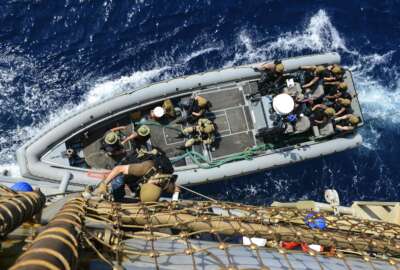
Farewell to longest-serving Navy secretary in modern era
Ray Mabus became the longest-serving Navy secretary since Josephus Daniels, Woodrow Wilson’s secretary during the first world war.
Back in 2009, when Ray Mabus got the call from the team serving a newly-inaugurated president asking him to become the 75th secretary of the Navy, he happily accepted the position. But like most political appointees, he wasn’t sure how long he’d be willing to do the job.
As it turned out, Mabus became the longest-serving Navy secretary since Josephus Daniels, Woodrow Wilson’s secretary during the first world war.

“It’s been a very happy time for me, and I hope it was for the Navy and Marine Corps too,” he told me in an interview for Federal News Radio’s On DoD. “It’s the best job I can imagine: It’s global, it’s incredibly important. It’s big enough that you can have impacts on things, but it’s personal enough that you can see those impacts on people and individual situations.”
One of the reasons Mabus decided to stick around for eight years, rather than the two or three that are typical of most military department secretaries, is that he quickly concluded that most political appointees’ priorities can be easily brushed aside by a Pentagon bureaucracy that’s grown very accustomed to seeing leaders come and go, or having their positions not filled at all.
“As I was looking around at the things I started and thinking about how long to stay, the notion of being able to carry some of these things from start to finish and see the fruits of some of the early labor made a whole lot of sense to me,” he said. “The big danger in any of these jobs is that you’ll get slow-rolled: the bureaucracy will decide you’re not going to be around for very long and that they just need to wait you out.”
Mabus – unlike many of his counterparts who served in DoD at the start of the Obama administration – had almost no experience with the department he was set to lead. The former Mississippi governor and U.S. ambassador to Saudi Arabia had served a brief stint as a young officer aboard a Navy cruiser in the early 1970s, but had no direct experience in Defense management. In retrospect, he sees that as an asset.
“I didn’t know what the issues were, and I think that’s one of the great strengths I brought to the Navy. It’s a huge advantage to have fresh eyes,” he said. “If you have too much of the D.C. revolving door between the Pentagon and think tanks, up to the Hill and back, there’s something to be said for experience, but you also fall into predictable ways of thinking and you develop a certain viewpoint. Jobs like this, from time to time at least, benefit from having someone who doesn’t know what the issues are. The learning curve is big, but it’s very doable. Because one of the things the Pentagon does very well is preparing a nominee for a confirmation hearing but also for the job in terms of briefing you on all the issues that are out there, and that’s how I picked the things I wanted to focus on.”
A transition to alternative energy sources was one area Mabus began to tackle very early in his tenure when he committed to getting at least half of the Navy Department’s energy from non-traditional sources by 2020, reasoning that its dependence on foreign fossil fuels made it vulnerable to coercion and, in certain cases, needlessly put troops lives in danger as they escorted tanker convoys through hostile areas. The Navy and Marine Corps have already met the target for their shore-based energy, and alternative fuels now make up an estimated 30-percent of their consumption at sea and in the air.
Has the recent revolution in domestic fossil fuel extraction and production lessened the urgency to switch to alternatives?
“Not really,” Mabus said. “Because we buy our fuel around the world, and oil is a global commodity. I’ll give you an example: Near one of our ports in Singapore, there’s an oil refinery that’s owned mainly by the Chinese. Right down the road is a biofuel refinery that’s owned by a Finnish company. I don’t want to be dependent on the Chinese for our supply of fuel in the Western Pacific.”
Later, Mabus devoted considerable attention to reforming Navy personnel policies, including by tripling paid maternity leave (a decision later scaled back by Defense Secretary Ash Carter), adjusting military promotion policies to focus more on merit and less on seniority, creating more pathways for servicemembers to move in and out of military service and advocating the opening of all combat positions to women.
“I have been trying very hard to have a more diverse force – not diversity for diversity’s sake, but diversity of thought, diversity of background, diversity of experience,” he said. “Every time we’ve opened up the military, we’ve gotten stronger. It happened when we desegregated in the late ‘40s, it happened when we started recruiting more women in the ‘80s, it happened when we repealed Don’t Ask Don’t Tell, it happened when I put women on submarines and riverines in 2010, and it happened when the decision was made to open all ground combat specialties to women this year.”
Not all of the personnel changes have been warmly embraced by the uniformed workforce. The Navy’s most recent decision to do away with the rating titles enlisted personnel have used since the service’s inception has so far generated more than 103,000 protest signatures on the White House’s We the People website, well in excess of the threshold needed to guarantee an official response from the Obama Administration.
But Mabus downplayed the scale of dissatisfaction among currently-serving sailors.
“I’d say the great majority of the pushback comes from the alumni associations,” he said. “I understand that. It’s like, ‘Things were perfect when I was in the Navy, then I left and you guys messed it up and you didn’t check with me.’ But the reason we’re doing it is that the ratings we have right now are very narrowly tailored, and a lot of times because they are so narrow, you don’t have a promotion opportunity and a lot of times there’s only one place a sailor can go for their next duty station, if that. The third thing is because they’re so narrow, when people leave the Navy after 35 years as an aircraft mechanic, they can’t walk across the street to United or FedEx. You’ll still have your Navy Operational Specialty, but you can also qualify in another one, two or five other ones, and we’re going to align our training to things like FAA standards. I think that as people understand it’s going to make their careers easier and more flexible, four or five years from now, people are going to wonder what all the fuss was about.”
Read the latest news about the incoming administration on our Tracking the Transition page.
Copyright © 2025 Federal News Network. All rights reserved. This website is not intended for users located within the European Economic Area.
Jared Serbu is deputy editor of Federal News Network and reports on the Defense Department’s contracting, legislative, workforce and IT issues.
Follow @jserbuWFED



